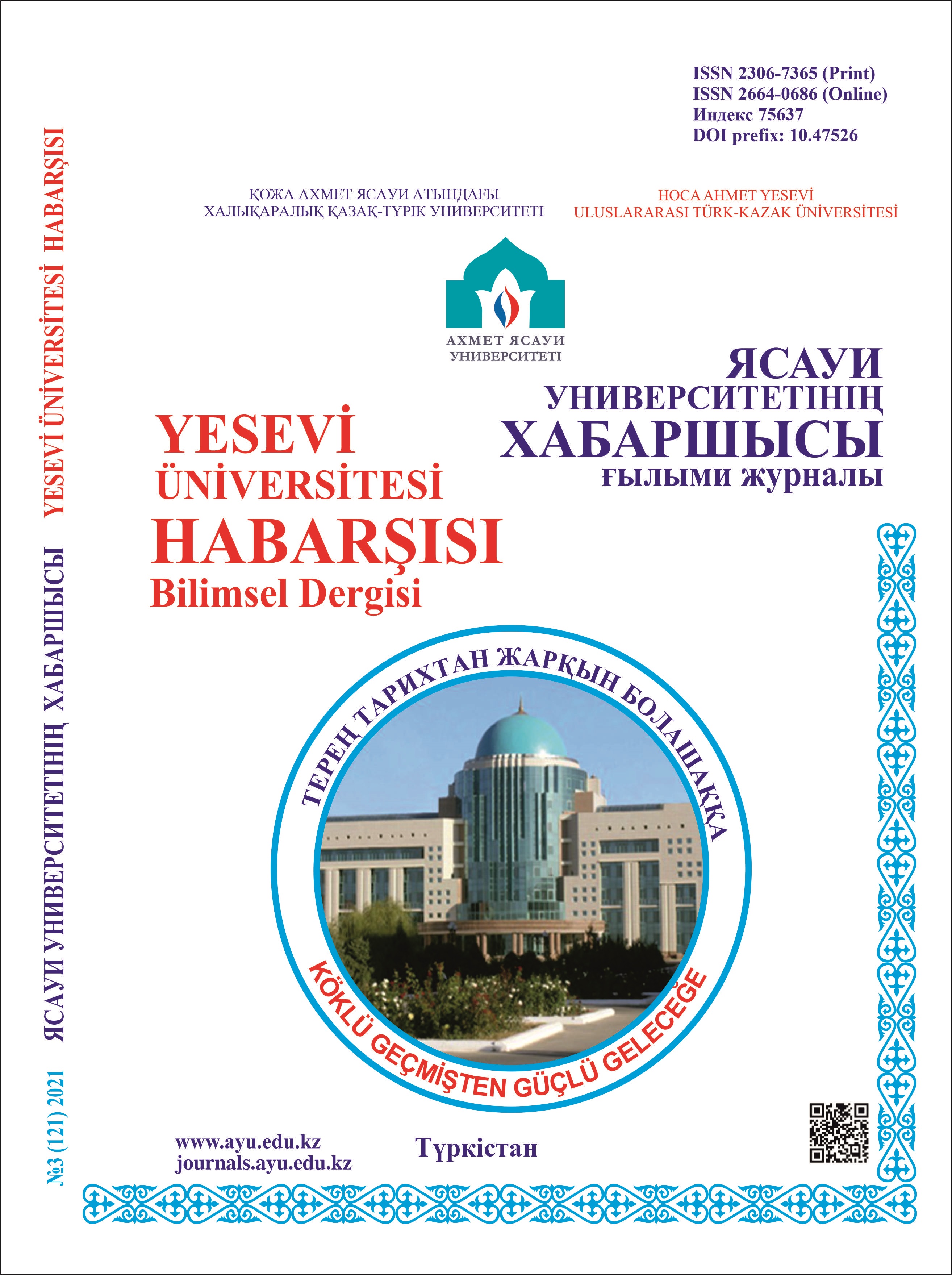YİRMİNCİ YÜZYILIN BAŞLARINDA TÜRK MİLLETLERİNİN ÇOCUK ŞİİR ÖĞRETİMİNİN YENİLİKÇİ VE TEKNOLOJİK ÖZELLİKLERİ
141 168
Anahtar Kelimeler:
Turkic peoples, children's poetry, innovative technologies, didactics, heuristic methods of teaching, cognitive teaching methods.Özet
This article considers the innovative and technological features of teaching humanity disciplines, including Kazakh literature, with the orientation of the teaching process in the higher education system to national values at the present time.
The innovative and technological features of innovative teaching of children's poetry of the Turkic nations at the beginning of the twentieth century are studied. It is determined that the core of the children's poetry of the Turkic peoples awakens in modern youth the desire to know the deep history of our roots. In teaching of literature in higher educational institutions, the emphasis on the educational power of artistic works is placed on modern approaches to understanding the meaning of the art of words, fiction in the upbringing of personality in some cases, when in the era of modern globalization the human being is changing, moving away from spirituality.
The article deals with the possibility of dividing classes into several groups, depending on the traditional and non-traditional nature in the modern education system. In the training of philologists, specialists in language and literature in higher vocational education, the following several general didactic principles of teaching literature (consistency and accessibility, activity of teaching literature, etc.) and heuristic methods of teaching, cognitive teaching methods are analyzed.
This article considers the classification of scientists-methodologists’ principles in teaching disciplines in the process of education system: 1) methodological principles; 2) scientific principles; 3) psychological principles; 4) individual didactic principles.
Methods of solving creative problems are divided in two groups (logical and heuristic). Features of the classification of heuristic methods of teaching are considered. Classification of cognitive methods of teaching into scientific methods, disciplines, metasubject methods and creative methods of teaching are pointed out.
Referanslar
Тоқаев Қ.К. Тәуелсіздік бәрінен де құнды // Егемен Қазақстан, 2021 жыл, 20 мамыр.
Назарбаев Н.Ә. «Қазақстандықтардың әл-ауқатының өсуі: Табыс пен тұрмыс сапасын арттыру» атты Қазақстан халқына Жолдауы // Егемен Қазақстан, 2018 жыл, 5 қазан.
Харламов И.Ф. Педагогика. – Минск: Университетское, 1979. – 186 с.
Бабанский Ю.К. Оптимизация учебно-воспитательного процесса (методические основы). – М.: Просвещение, 1982. – 192 с.
Лернер И.Я. Современная дидактика: теория-практика. – М.: Педагогика, 1995. – 172 с.
Сабыров Т. Болашақ мұғалімдердің дидактикалық дайындығын жетілдіру. – Алматы: РБК, 1999. – 83 б.
Құсайынов А.Қ. Салыстырмалы педагогика. – Алматы: ROND@A, 2011. – 256 б.
Андреев В.И. Педагогика высшей школы. Инновационно-прогностический курс. – Казань: Центр инновационных технологий, 2013. – 500 с.
Архангельский А.Н., Смирнова Т.Ю. Литература, 5 класс. Часть 2. – М.: Дрофа, 2017. – 120 с.
Таубаева Ш.Т., Булатбаева А.А. Методология и методика педагогических исследований. – Алматы: Қазақ университеті, 2015. – 214 c.
ҚР Білім туралы Заңы. – Астана: Литера, 2000. – 96 б.
Келімбетов Н. Түркі халықтарының ежелгі әдеби жәдігерліктері. – Алматы: Паритет, 2011. – 244 б.
REFERENCES
Toqaev Q.K. Tauelsіzdіk barіnen de qundy [Independence is more valuable than anything else] // Egemen Qazaqstan. 2021 jyl, 20 mamyr. [in Kazakh]
Nazarbaev N.A. «Qazaqstandyqtardyn al-auqatynyn osuі: Tabys pen turmys sapasyn arttyru» atty Qazaqstan halqyna Joldauy [Address to the people of Kazakhstan “Increasing the welfare of Kazakhstanis: increasing income and quality of life”] // Egemen Qazaqstan, 2018 jyl, 5 qazan. [in Kazakh]
Harlamov I.F. Pedagogika [Pedagogy]. – Minsk: Universitetskoe, 1979. – 186 s. [in Russian]
Babanskiy Iu.K. Optimizaciia uchebno-vospitatelnogo processa (metodicheskie osnovy) [Optimization of the educational process (methodological foundations)]. – M.: Prosveshenie, 1982. – 192 s. [in Russian]
Lerner I.Ia. Sovremennaia didaktika: teoriia-praktika [Modern didactics: theory-practice]. – M.: Pedagogika, 1995. – 172 s. [in Russian]
Sabyrov T. Bolashaq mugalіmderdіn didaktikalyq daiyndygyn jetіldіru [Improving the didactic training of future teachers]. – Almaty: RBK, 1999. – 83 b. [in Kazakh]
Qusaiynov A.Q. Salystyrmaly pedagogika [Comparative pedagogy]. – Almaty: ROND@A, 2011. – 256 b. [in Kazakh]
Andreev V.I. Pedagogika vysshei shkoly. Innovacionno-prognosticheskiy kurs [Pedagogy of the higher school. Innovative and prognostic course]. – Kazan: Centr innovacionnyh tehnologiy, 2013. – 500 s. [in Russian]
Arhangelskiy A.N., Smirnova T.Iu. Literatura, 5 klass [Literature, Grade 5]. Chast 2. – M.: Drofa, 2017. – 120 s. [in Russian]
Taubaeva Sh.T., Bulatbaeva A.A. Metodologiia i metodika pedagogicheskih issledovaniy [Methodology and methods of pedagogical research]. – Almaty: Qazaq universitetі, 2015. – 214 c. [in Russian]
QR Bіlіm turaly Zany [Law of the Republic of Kazakhstan on education]. – Astana: Litera, 2000. – 96 b. [in Kazakh]
Kelіmbetov N. Turkі halyqtarynyn ejelgі adebi jadіgerlіkterі [Ancient literary artifacts of the Turkic peoples]. – Almaty: Paritet, 2011. – 244 b. [in Kazakh]

